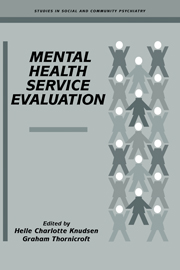Book contents
- Frontmatter
- Contents
- List of contributors
- Foreword
- Preface
- Part I INTRODUCTION
- Part II COMPREHENSIVE SERVICE EVALUATION PROJECTS
- Part III METHODS: MEASUREMENT, STRATEGIES AND NEW APPROACHES
- Part IV SYSTEM-LEVEL RESEARCH
- Part V PROGRAMME-LEVEL RESEARCH
- Part VI HEALTH ECONOMICS IN MENTAL HEALTH
- 20 Programme-level and system-level health economics
- 21 Conclusion
- Index
21 - Conclusion
from Part VI - HEALTH ECONOMICS IN MENTAL HEALTH
Published online by Cambridge University Press: 05 August 2016
- Frontmatter
- Contents
- List of contributors
- Foreword
- Preface
- Part I INTRODUCTION
- Part II COMPREHENSIVE SERVICE EVALUATION PROJECTS
- Part III METHODS: MEASUREMENT, STRATEGIES AND NEW APPROACHES
- Part IV SYSTEM-LEVEL RESEARCH
- Part V PROGRAMME-LEVEL RESEARCH
- Part VI HEALTH ECONOMICS IN MENTAL HEALTH
- 20 Programme-level and system-level health economics
- 21 Conclusion
- Index
Summary
The preceding chapters in this book have indicated the considerable achievements to date of mental health service research, the shortcomings which remain and the complexities and paradoxes involved in this type of research work, and they allow us to set out an agenda for the future.
In terms of the longer-term timescale, the technical achievements of mental health service research now put us in a unique historical position. There is the possibility that service evaluation can produce firm findings with which to inform mental health service policy and clinical practice. Our predecessors operated to a much greater extent within an informational vacuum when formulating policy and practice guidelines. The availability of research to provide a rational basis, or at least contribution, is a relatively recent phenomenon. In particular we now have good-quality information, although arising too often from small-scale experimental settings, regarding individual patient outcomes in community-orientated systems of care. We have developed in many domains assessment instruments which have undergone rigorous assessment of their psychometric properties, many of which have been developed under the auspices of the WHO Mental Health Division. We have produced more penetrating forms of statistical analysis. In addition, in the research literature we have many examples of excellent clinical practice which should now be subject to detailed research scrutiny and replication, and which should also be subject to rigorous economic evaluation.
A distinct advantage enjoyed for mental health service evaluation, compared with research in other areas of medicine, is that psychiatric services are often informed by a public health perspective. Services are often planned for defined geographical areas, many research workers adopt an epidemiological approach, and this facilitates a population-based assessment of service needs. In specific sites psychiatric case registers have proved an invaluable tool to make such assessments longitudinal, accurate and clinically related. The relatively recent availability and affordability of personal computers has meant that small-scale case registers are now widespread, although very variable in their implementation. The introduction into this field of research of clinical and non-clinical staff with an increasingly high standard of technical training in research design, and statistical analysis, has raised the scientific quality of much work during the last decade.
- Type
- Chapter
- Information
- Mental Health Service Evaluation , pp. 365 - 367Publisher: Cambridge University PressPrint publication year: 1996



